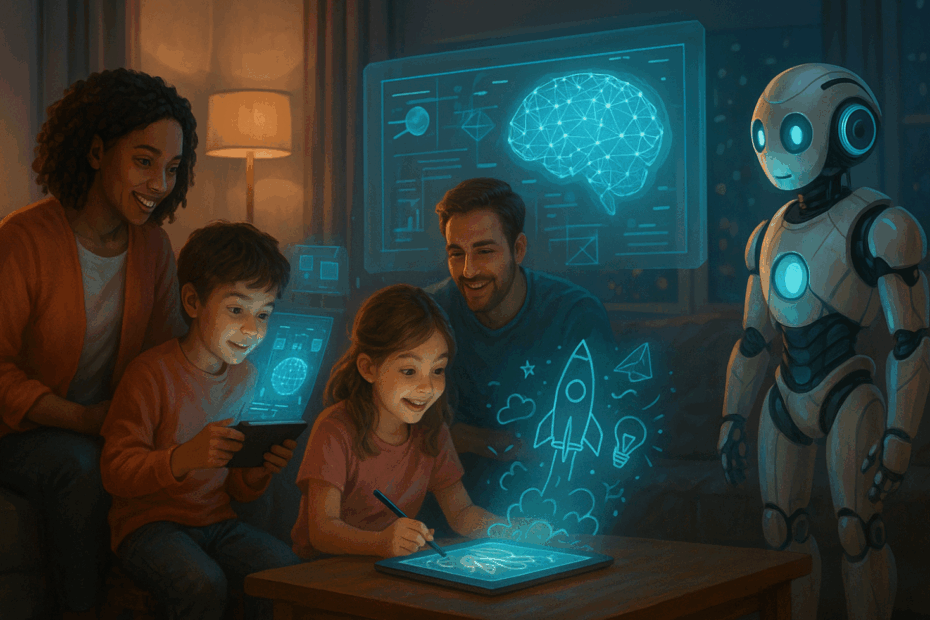🌍 Why AI Isn’t Just the Future—It’s the Present
Artificial Intelligence (AI) is no longer a futuristic concept from sci-fi movies—it’s already integrated into nearly every aspect of our daily lives. From Siri and Alexa to personalized YouTube suggestions, AI is influencing the way we communicate, learn, work, and make decisions. And for our children, AI will be as natural a part of life as electricity is for us.
But here’s the thing: our education systems, parenting strategies, and cultural frameworks aren’t evolving fast enough. The truth is, we are preparing our kids for a world that no longer exists.
At Transition and Evolve, we believe it’s our responsibility—not just as educators, coaches, or entrepreneurs, but as conscious parents and role models—to help the next generation thrive in an AI-powered world. So how do we do that?
This article is your comprehensive roadmap.
🚀 What Does “Being AI-Ready” Really Mean?
Being AI-ready isn’t about turning your child into a coder or data scientist (unless they want to be). It’s about helping them develop:
- Adaptability
- Critical thinking
- Ethical awareness
- Digital literacy
- Emotional intelligence
- Creative confidence
These human-centered skills are what will make our kids not only resilient—but irreplaceable—in the future workforce and society.
👩💻 1. Start with Curiosity, Not Fear
Kids are naturally curious. So instead of warning them about the “dangers” of technology, foster a healthy and conscious relationship with it.
How:
- Encourage open conversations about how AI works (use age-appropriate language).
- Explore fun tools like ChatGPT, Suno (music generation), or image creation apps together.
- Watch documentaries or YouTube explainers about how robots and AI help people.
🔑 Parent tip: Your energy matters. If you’re fearful of AI, your kids will be too. Instead, model curiosity and empowerment.
🧠 2. Teach Critical Thinking Over Blind Consumption
Children today are bombarded with digital content, much of it AI-curated. That’s why critical thinking is no longer optional—it’s essential.
How:
- Ask them, “Do you think this video is true?” or “Who created this and why?”
- Teach them how algorithms work—how YouTube or TikTok recommends content.
- Play games that involve logic, problem-solving, or strategy.
🔑 Parent tip: Encourage them to question, reflect, and verify—the building blocks of digital wisdom.
❤️ 3. Develop Their Emotional Intelligence (EQ)
AI might master data, but it still can’t replicate empathy, kindness, or connection.
How:
- Help them name and navigate their emotions.
- Talk about how their online behavior affects others.
- Encourage real-life social interaction (yes, even if it means putting down the screens!).
🔑 Parent tip: The most future-proof skill is the ability to understand, manage, and relate to emotions.
🌐 4. Introduce Digital Literacy Early
Digital literacy isn’t just about using a tablet. It’s about understanding how digital tools work—and how to use them safely and responsibly.
How:
- Teach privacy basics: strong passwords, avoiding oversharing, and knowing who to trust.
- Set up parental guidance not just as surveillance, but as shared responsibility.
- Use family time to explore online tools together.
🔑 Parent tip: Make tech use a co-learning experience instead of a solo one.
🎨 5. Prioritize Creativity Over Consumption
One of the biggest myths is that AI will “kill” creativity. In fact, AI is a tool that can boost creative expression—but only if kids are encouraged to be creators, not just consumers.
How:
- Let them write stories with AI, create music using AI platforms like Suno, or build games.
- Encourage offline creativity too—drawing, storytelling, acting, crafting.
- Show them how artists, designers, and creators are using AI in exciting ways.
🔑 Parent tip: Creativity isn’t just painting—it’s problem-solving, innovation, and imagination in action.
🧩 6. Help Them Understand Ethics and Responsibility
AI raises big questions: What’s fair? What’s private? What’s real? Your child will one day make decisions in a world where deepfakes, surveillance, and biased algorithms are real.
How:
- Talk about values: fairness, inclusion, truth, and consent.
- Watch movies like Wall-E, Big Hero 6, or The Mitchells vs. The Machines and discuss the ethical dilemmas.
- Ask open-ended questions like “What would you do if…?”
🔑 Parent tip: Help them become conscious creators and not passive participants.
🌱 7. Invest in Lifelong Learning, Not Just Schooling
In a world where jobs and industries change rapidly, teaching kids how to learn is more important than what they learn.
How:
- Celebrate curiosity, not just grades.
- Model your own learning—take an AI course and tell them what you’re learning.
- Encourage experimentation and failure as part of growth.
🔑 Parent tip: Lifelong learners will never be left behind.
🌟 Final Thoughts: The Future Is Human + AI
The world your child will enter is not humans vs. AI—it’s humans + AI. And the best preparation is to equip them with the human skills that no machine can replicate.
At Transition and Evolve, we believe parenting in the age of AI is about:
✨ Empowering, not protecting
✨ Guiding, not controlling
✨ Preparing, not fearing
Because raising conscious, emotionally intelligent, and AI-literate kids isn’t just good parenting—it’s the future of humanity.
💬 Want to Dive Deeper?
We’re working with educators, coaches, and conscious families to help design the future of education and empowerment. Reach out if:
- You want personalized guidance to help your family thrive in the digital age
- You’re a school, coach, or organization looking to prepare kids and teens for a world with AI
- You’re curious how tools like Lifebook can help raise emotionally resilient, visionary kids
✨ Ready to Future-Proof Your Family?
The future isn’t waiting—and neither should you. If you’re ready to raise emotionally intelligent, AI-aware, and empowered kids who thrive in a rapidly changing world, let’s talk.
📩 Contact Maria at Transition and Evolve for personalized guidance, family-focused workshops, or to bring future-ready education into your community or organization.
Maria Randall

